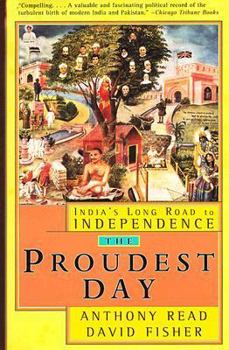The Proudest Day: India's Long Road to Independence
Select Format
Select Condition 
Book Overview
And yet when independence came on the stroke of midnight of August 14, 1947, events unfolded with a violence that shocked the world: entire trainloads of Muslim and Hindu refugees were slaughtered on their flight to safety -- not by the British, but by each other. Macaulay's dream had become a flawed and bloody reality. The Proudest Day is a riveting account of the end of the Raj, the most romantic of all the great empires. Anthony Read and David Fisher tell the whole epic story in compelling and colorful detail from its beginnings more than a century earlier; their powerful narrative takes a fresh look at many of the events and personalities involved, especially the three charismatic giants --Gandhi, Nehru, and Jinnah --who dominated the final, increasingly bitter thirty years. Meanwhile, a succession of British politicians and viceroys veered wildly between liberalism and repression until the Raj became a powder keg, wanting only a match.
Format:Paperback
Language:English
ISBN:0393318982
ISBN13:9780393318982
Release Date:July 1999
Publisher:W. W. Norton & Company
Length:608 Pages
Weight:2.10 lbs.
Dimensions:1.0" x 6.2" x 9.3"
Customer Reviews
5 ratings
A review of Indian Independance Movements-Heroes and Pretend
Published by Thriftbooks.com User , 22 years ago
An exellent book delaing with the Indian independence movement.It starts with the British massacre of hundreds of Indians attending a peaceful meeting in Jallianwallah Bagh, which turned the tide and ends with division of of the subcontinent into Muslin Pakistan and more secular India and the loss of millions of lives on both sides of the devide during the ensuing riots, and the birth of the the Indepenedent India and Pakistan. The book colorfully portrays the charecters involved in the drama-the likes of Jinnah the father of modern Pakistan, Mahatma Gandhi, Jawahrlal Nehru and Mountabatten their arrogance and vanity, Gandhi's apparent dislike of Jinnah from the very begining and his non-democratic management of the congress party. Jinnah was a secular muslim. In the begining it was not his intention to carve a seperate Islamic Pakistan from the Indian subcontinent. The dogmatic refusal to accept the Cripps Mission, whose offer of dominion status would have saved the division of the subcontinent and subsequent loss of millions of lives. The initial arrogance and later withdrawl of the British in a hurry without a great deal of thought resulting not only the worst religiously motivated riots, massive loss of lives and boarder problems between India and Pakistan. Only the common people of India emerge as the heroes in this book. It is a well researched thoughtfully written book and it should be read by any with an interest in the subcontinent.
A delightful and instructive overview of British India.
Published by Thriftbooks.com User , 24 years ago
I am glad I bought this book. There is nothing new here for the reader well versed in the history of India. However, the language and presentation model is quite brisk and makes for a easy read. The material is fairly encompassing given that the purpose of the book is for the general reader. I found the narrative both interesting and fast moving. A good start for someone desiring to know present day India.
A Richly Detailed Story. . .
Published by Thriftbooks.com User , 25 years ago
Given that so much has been written on the movement towards independence already in the last few years, I came with skepticism to this book, given that neither of the authors had significant experience in Indian history before. This becomes clear in their research and writing, which at times seems to borrow too extensively from prior works and in effect surveys previous surveys. Nonetheless, The Proudest Day accomplishes one singular feat: it paints a coherent story of more than 60 years of struggle, full of coloured yet flawed personalities such as Jinnah and Gahndi and momentous occasions, from the Amritsar Massacre to the endgame hysteria after WWII. It gives form to what more than anything was a series of stop and goes over a half a century.Much of the author's criticism of the main protagonists is not new. The myth of Gahndi's pacifism is debunked. In Nehru's uncompromising idealism, the authors lay the blame for eventual partition. Jinnah is the consumate lawyer, manipulating and playing with legal vagueries. But it is for Mountbatten and the Congress hard-liners that the harshest criticism is reserved. Partition comes down to one missed chance in the summer of 1946. Whether or not in the emotional-charged atmosphere of Indian-Pakistan history you accept this proposition, the authors succeed in leaving that bitter feeling in the reader's mind- that partition, the holocaust that ensued after August 1947 in Punjab, and years of ensuing conflict could have all been avoided even after 50+ years of heated struggle if only in that last instance, the main protagonists laid aside their prior histories, showed their courage and seized the moment.
An excelent read, both informative and gripping
Published by Thriftbooks.com User , 25 years ago
The book is one of the most comprehensive historical works on the British Raj in India. I was pleasently surprised to read a relatively unbiased approach to history. The authors view of historical fact is remarkably uncolored by reverence and they are presented as such. The book is also not judgemental of history and reader is presented with differing historical reactions, leaving the reader to make up his own mind. The research is extensive and well documented. All in all a must read for anybody interested in the History of the India during the British Rule.
Outstanding Overview
Published by Thriftbooks.com User , 26 years ago
This is an outstanding book and a must read for anyone interested in the world's largest democracy and the sub-continent.






